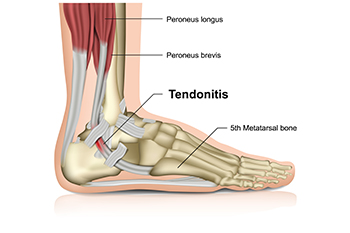
Achilles tendon injuries are common among athletes and active individuals. Symptoms typically include pain and stiffness in the back of the heel, especially after physical activity. Swelling and tenderness in the affected area are also common, sometimes accompanied by a popping sound during injury. Causes of Achilles tendon injuries can include sudden increases in physical activity, lack of proper warm-up, and wearing improper footwear. Tight calf muscles and a history of tendonitis can also contribute to the risk. Preventing Achilles tendon injuries involves regular stretching of the calf muscles, gradual increases in activity levels, and wearing supportive footwear. Ensuring proper warm-up and cool-down routines are essential for maintaining tendon health. If you have endured this type of injury, it is suggested that you schedule an appointment with a chiropodist who can guide you toward the most appropriate treatment method.
Achilles tendonitis is a common injury of the Achilles tendon, a band of fibrous tissue that runs along the back of the lower leg. The Achilles tendon can also rupture, making it impossible to lift the foot. If you are suffering from heel or calf pain, please consult with Emily Yu, B.Sc from Uptown Foot Care Clinic. Our specialist can help you maintain the health of your lower limbs and your mobility.
Causes of Achilles tendon injuries include:
Repetitive stress or overuse
Sudden increase in activity levels
High impact injury
Calf muscle tightness or weakness
Altered foot biomechanics
Heel bone spurs
Underlying medical conditions that weaken the tendon
Symptoms of an Achilles tendon injury include:
Heel and calf pain that worsens following exercise
Chronic heel and calf pain
Sudden pain in the back of the ankle or calf
A popping or snapping sensation
Thickened lump in the Achilles tendon
Ankle and calf stiffness
Decreased range of motion in the affected foot
Swelling
Difficulty walking
Treatment
Resting the affected leg
Applying ice
Compressing the foot and ankle
Elevating the injured leg
Wearing orthotics
Low impact exercises
Stretches
Strengthening exercises
Non-steroidal anti-inflammatory medications
Cortisone injections
Surgery, if the tendon is ruptured
Achilles tendon injuries can be very painful and lead to reduced mobility if left untreated. If you have any questions, please feel free to contact our office located in . We offer the newest diagnostic and treatment technologies for all your foot care needs.
